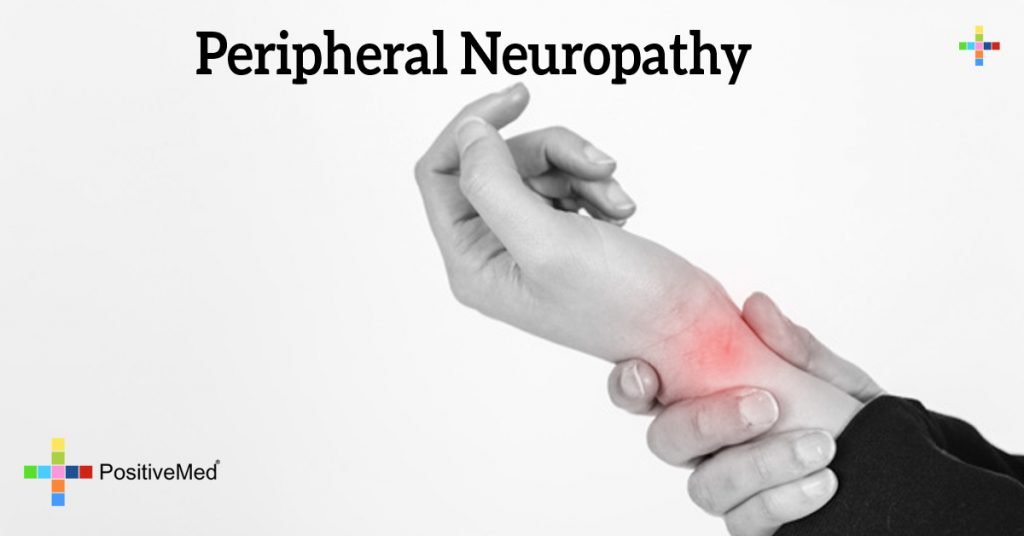
Peripheral Neuropathy
By PositiveMed-Team
Edited By Stephanie Dawson
Peripheral neuropathy is a form of nerve damage that affects the peripheral nervous system, such as hands and feet, and most frequently causes pain and/or numbness. It is the most common form of neuropathy and a frequent symptom for long-term diabetics, though it can also be caused by toxins, injury, infection, alcoholism, nutritional deficiencies, tumors, inherited neuropathies, and other health issues.
The peripheral nervous system is a collection of nerve fibers and nerve endings running throughout the human body outside of the brain and spinal column. Therefore, peripheral neuropathy is an issue where the nerve signals between the sensory nerves, motor nerves, and autonomic nerves (which is the peripheral nervous system) and the central nervous system miscommunicate.

Symptoms of neuropathy usually start in the hands or feet, as it affects the longest nerves first. Sensations have been described as a tingling or numbness, a feeling of burning or sharp, jabbing pains, being overly sensitive sense of touch, and sometimes even a loss of control over the affected muscles. Sometimes, the digestive system, including the bladder and bowel, are affected or even skin, hair, and nails will change.
A good thing to remember is that different nerves have different “jobs” – sensory nerves which indicate temperature, pain, or touch; motor nerves that control muscle movement; autonomic nerves which control blood pressure, heart rate, digestion, and bladder function. Taking this into account, symptoms and severity will obviously vary greatly depending on the nerve grouping that is affected. Not to mention, neuropathy can strike a single nerve “mononeuropathy” two or more but in different areas “multiple mononeuropathy”, or several of them “polyneuropathy.”

Think of peripheral neuropathy as a pianist at the grand piano that is the human nervous system. One key may be struck for a long period of time or several at once for shorter periods, all at greater intensities. Therefore, while two “pianists” (peripheral neuropathy) may play the same piece (similar symptoms), and “pianos” (humans) generally have the same parts, there will always be unique notes that delineate each person’s experience.
A person may be at risk for peripheral neuropathy if they have a history of infections such as Lyme disease, shingles, or hepatitis C. Another risk factor is a history of alcoholism, autoimmune disease, or diabetes. Repetitive physical stress on the body, vitamin deficiency, and kidney/thyroid/liver disorders can also lead to this issue. One should seek medical care right away if there’s any noticeable unusual tingling, weakness, or pain in the hands or feet. Early diagnosis and treatment offers the best chance for controlling symptoms and preventing further damage to peripheral nerves. If the symptoms interfere with sleep or are accompanied by depression, a doctor or pain specialist may be able to suggest treatments that can help.
This is a painful condition but one that can improve if one’s overall health improves. A proper diabetic diet, where appropriate, is critical. Also nutritional supplements, particularly including b-complex vitamins and magnesium can relieve neuropathy symptoms. Other popular dietary supplements are Acetyl-l-carnitine and alpha-lipoic acid, which have helped some people with the unpleasant prickling sensation and the severity of their symptoms. As an aside, alpha-lipoic acid has also been shown to also prevent neuropathies in diabetic persons. Acupuncture for neuropathy is a promising alternative therapy for neuropathic pain. Similarly, exercise and massage can promote circulation and stimulate the nerves and ideally should be part of everyone’s routine.
Citations
Chemotherapy-induced Peripheral Neuropathy, 2002 http://link.springer.com/article/10.1007/PL00007853#page-1
Two Styles of Acupuncture for Diabetic Neuropathy, http://aim.bmj.com/content/25/1-2/11.short
Alpha-Lipoic Acid & Diabetic Neuropathy, http://diabetes.diabetesjournals.org/content/46/Supplement_2/S62.short
Peripheral Neuropathy, Mayo Clinic http://www.mayoclinic.com/health/peripheral-neuropathy/DS00131





